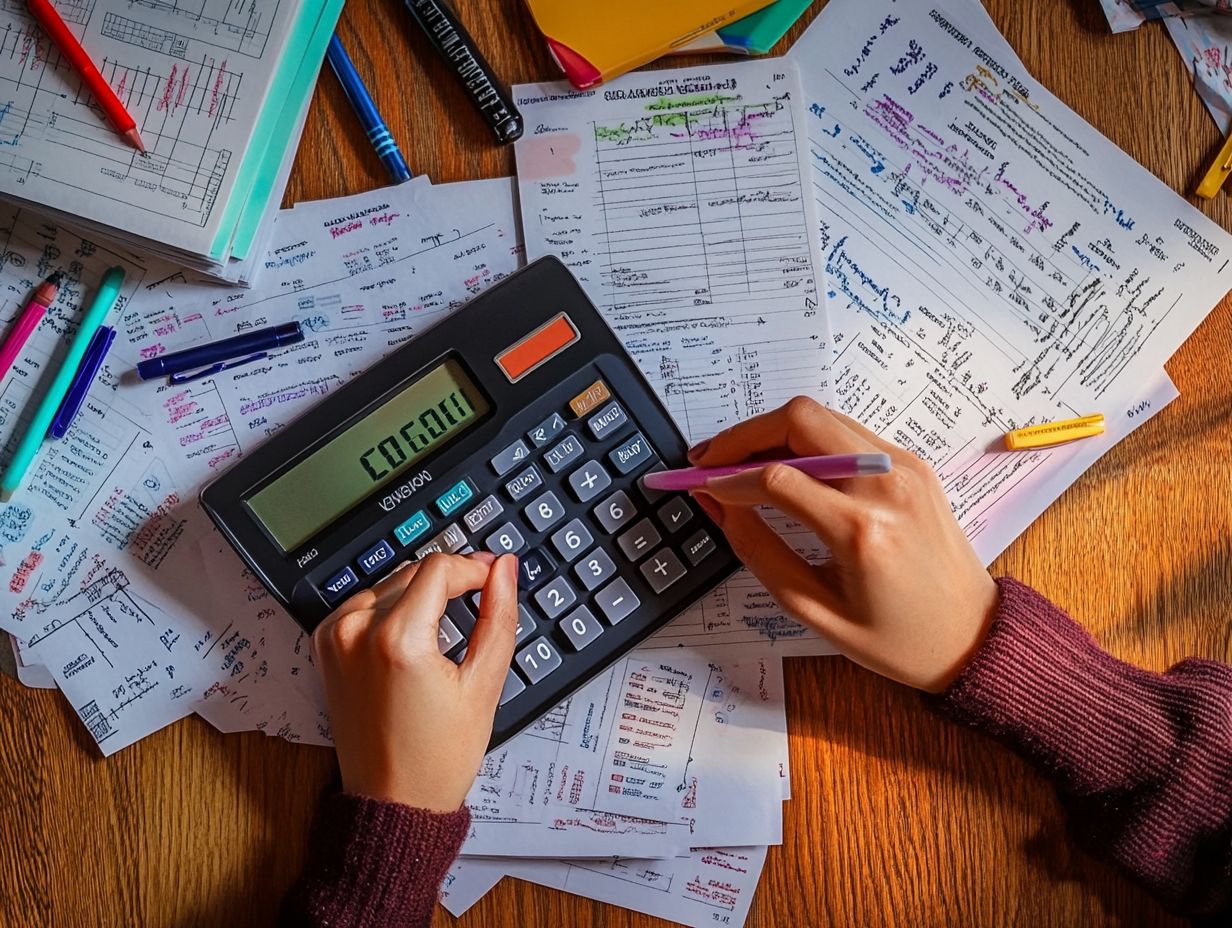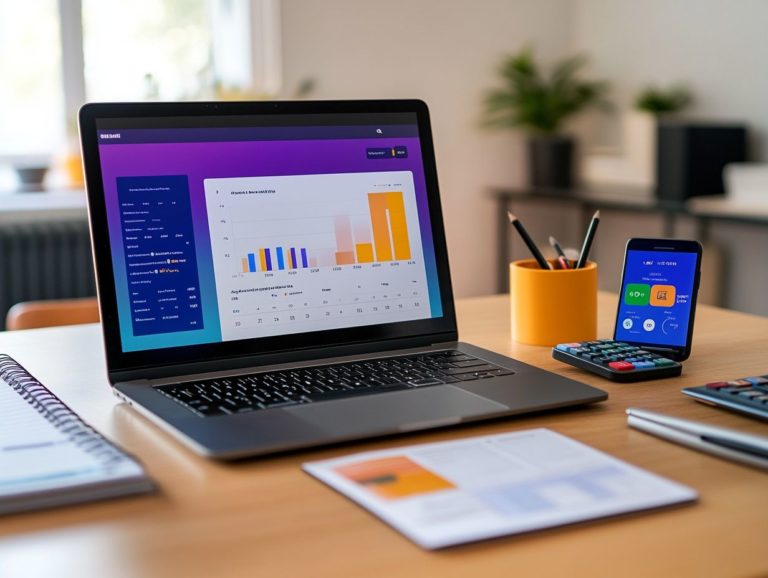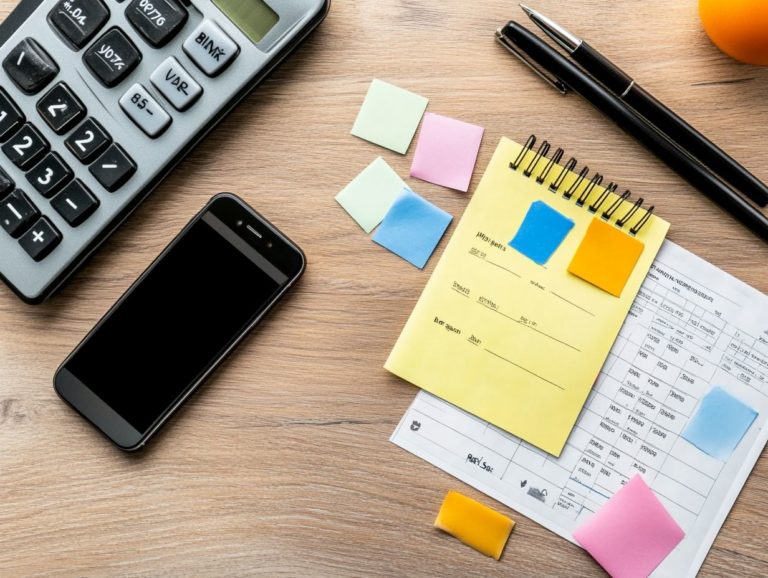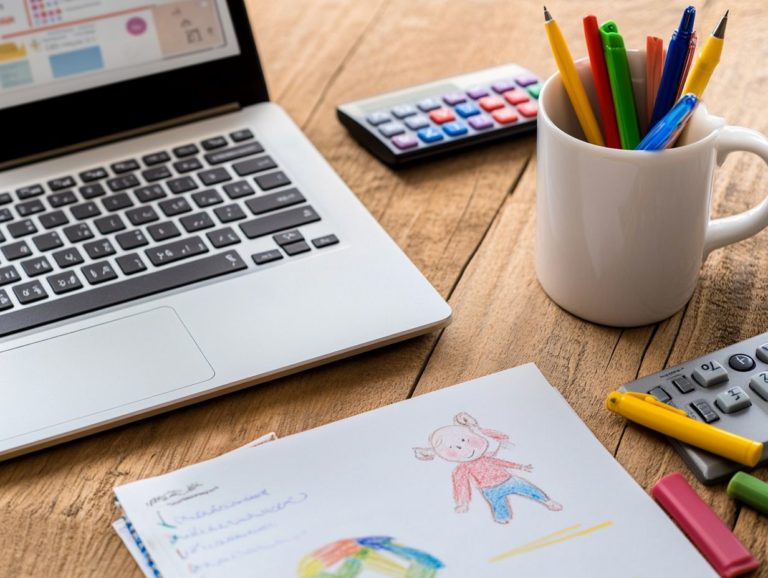How to Make Budgeting Tools Work for You
In today s fast-paced world, managing your finances can often feel daunting. Budgeting is crucial for achieving financial stability and success. Finding the right tools to guide you can truly make a difference.
This article explores why budgeting tools matter, offers an overview of various methods, and presents tips on how to select and use them effectively. Whether you re just starting your budgeting journey or looking to refine your existing strategy, you ll uncover valuable insights that will help you reach your financial goals while avoiding common pitfalls.
Start taking control of your finances today!
Contents
- Key Takeaways:
- The Importance of Budgeting Tools
- Types of Budgeting Tools
- Choosing the Right Budgeting Tool for You
- Using Budgeting Tools Effectively
- Maximizing the Benefits of Budgeting Tools
- Common Mistakes to Avoid when Using Budgeting Tools
- Frequently Asked Questions
- What are budgeting tools and how can they help me?
- How do I choose the right budgeting tool for me?
- Do I have to stick to a strict budget once I start using a budgeting tool?
- How often should I review my budget using a budgeting tool?
- Can I use budgeting tools to save for specific financial goals?
- How can I make sure I stick to my budget when using a budgeting tool?
Key Takeaways:

- Budgeting helps you manage your finances effectively.
- Choose a budgeting tool that fits your needs and lifestyle.
- Set realistic goals and track your expenses regularly.
The Importance of Budgeting Tools
Budgeting tools are critical for managing your money situation. They help you create a personal budget that aligns with your financial goals while providing insights into your spending behaviors. By leveraging these budgeting tools effectively, you can categorize your expenses, monitor your spending patterns, and refine your budget for better financial wellness.
You can also leverage these tools effectively from online banking platforms to specialized budgeting apps like Mint and YNAB. These options allow you to automate your financial decisions and keep a close eye on your cash flow, setting you up for lasting financial security.
Why Budgeting is Essential for Financial Success
Budgeting is crucial for achieving financial success. It provides a structured way to manage your income and expenses, ensuring you live within your means while saving for future goals.
By monitoring your financial flows, you can understand your spending habits and identify areas for improvement. For example, setting a monthly spending limit on discretionary expenses like dining out can motivate better choices like cooking at home or finding free local events.
This mindful approach to financial decisions can reduce unnecessary expenses and help you allocate more funds toward savings or investments. Over time, these improved spending habits can significantly enhance your financial situation, providing stability and security for your future.
Types of Budgeting Tools
You have a wealth of budgeting tools at your disposal to help navigate your finances. These range from traditional methods to advanced online platforms and AI budgeting apps that use technology to improve your financial choices.
Overview of Different Budgeting Methods
Understanding different budgeting methods enables you to choose the approach that fits your financial journey. Whether you prefer strict cash flow management or a more flexible strategy considering both fixed and variable expenses, there are options for everyone.
Experimenting with various techniques can enhance your ability to track spending and prioritize savings. For instance, the envelope system involves physically dividing cash into envelopes for specific spending categories, making it easier to visualize your consumption.
Zero-based budgeting allocates every dollar of your income to specific expenses, savings, or debt repayment, ensuring nothing goes unspent. The 50/30/20 rule suggests that half of your income should cover needs, with the rest flexibly divided between wants and savings.
Each method presents unique advantages tailored to different financial goals, ultimately enhancing your personal accountability and awareness.
Choosing the Right Budgeting Tool for You

Choosing the right budgeting tool is crucial for managing your personal finances effectively. It enables you to make informed decisions that resonate with your unique lifestyle and aspirations, especially when you learn how to use budgeting tools during a financial crisis.
Factors to Consider when Selecting a Budgeting Tool
When choosing a budgeting tool, you should carefully consider factors like expense tracking, financial insights, and seamless integration with your online banking and financial institutions.
A user-friendly interface makes your experience enjoyable and simple. It’s essential to seek tools that have robust security measures in place to protect your personal information safeguarding your financial data is crucial.
Responsive customer support can be a game-changer, providing you with the assistance you need when challenges arise or questions pop up. These features work together to foster effective money management, enhancing your financial coaching by offering clarity and structure, ultimately guiding you toward responsible spending and informed financial decisions.
Using Budgeting Tools Effectively
Harnessing the power of budgeting tools starts with intent. Review your budget regularly and set financial goals with budgeting tools. Actively tracking your expenses will elevate your financial management to new heights.
Embrace these practices, and watch your financial landscape transform.
Tips for Sticking to Your Budget
Sticking to your budget can be daunting, but use effective budgeting strategies to stay on track. Understand how emotions influence spending.
One practical approach is to set up automatic transfers to your savings accounts. This ensures that a portion of your income is directed into an emergency fund before you even have a chance to spend it. This method helps you resist the lure of overspending while nurturing the habit of saving.
Using spending tracking tools can provide valuable insights into your financial behavior. By categorizing your expenses and identifying patterns, you’ll find it easier to pinpoint areas where adjustments can be made.
Embracing these strategies enables you to cultivate a more disciplined financial mindset and make informed decisions that align with your long-term goals.
Maximizing the Benefits of Budgeting Tools
To truly unlock the potential of budgeting tools, you must align them with your financial goals. This approach enables you to gain invaluable insights into your finances while adeptly managing both your savings and expenditures, as outlined in how to visualize your budget with tools.
How to Achieve Your Financial Goals with Budgeting

Achieving your financial goals through effective budgeting requires a thoughtfully constructed budget that accounts for your cash flow, sets clear spending limits, and categorizes your expenses appropriately.
To manage your finances effectively, consider utilizing budgeting tools that can help you budget effectively to significantly improve your ability to track income and expenses in real time. It’s essential to craft a detailed budget that outlines your current financial responsibilities while also anticipating future expenditures.
By employing these tools, you can identify spending patterns, enabling you to allocate funds toward your savings or investment goals. Learning how to use budgeting tools for emergency funds can enhance your financial planning. Regularly reviewing and adjusting your budget ensures you can make necessary changes as your circumstances evolve, keeping your financial objectives firmly in sight.
Integrating cash flow management into this process is crucial, as it enables you to differentiate between wants and needs, ultimately leading to more informed financial decisions.
Common Mistakes to Avoid when Using Budgeting Tools
Avoid common mistakes with budgeting tools by learning how to use budgeting tools for future planning. This will help ensure your financial decisions lead to positive outcomes rather than creating budgeting challenges and setbacks.
Pitfalls to Watch Out for and How to Avoid Them
Common pitfalls can easily derail your budgeting journey, such as neglecting to review your budget regularly or failing to categorize your expenses properly. These oversights can profoundly affect your money situation.
Such missteps create an inaccurate picture of your financial landscape, making it challenging to track spending patterns and adjust as needed. If you skip breaking down your expenses into distinct categories, it can lead to confusion and overspending in areas that require closer attention.
Make it a priority to review your budget every month! This ensures that all expenditures are accurately documented and analyzed. Adopting this proactive approach enhances your decision-making and cultivates financial discipline, paving the way for more responsible spending habits.
Frequently Asked Questions
What are budgeting tools and how can they help me?
Budgeting tools are resources that help you manage your finances and track your expenses. They can include apps, spreadsheets, or even pen and paper methods. These tools assist you in creating a budget, setting financial goals, and monitoring your spending habits.
How do I choose the right budgeting tool for me?

The best budgeting tool for you will depend on your personal preferences and financial needs. Start by researching different options and consider factors such as cost, user-friendliness, and features. You may also want to ask for recommendations from friends or family who have successfully used budgeting tools.
Do I have to stick to a strict budget once I start using a budgeting tool?
No, the purpose of budgeting tools is to help you understand and manage your finances better. You can adjust your budget as needed and make changes based on your financial goals and current circumstances. For more insights, check out how to use budgeting tools for long-term goals. The key is to consistently use the budgeting tool and make adjustments as necessary.
How often should I review my budget using a budgeting tool?
It is recommended to review your budget at least once a month to ensure you are staying on track with your financial goals. However, you may also want to check in more frequently if you have a fluctuating income or expenses.
Can I use budgeting tools to save for specific financial goals?
Yes, many budgeting tools allow you to set specific financial goals and track your progress towards achieving them. This can be helpful for saving for a down payment on a house, paying off debt, or building an emergency fund.
How can I make sure I stick to my budget when using a budgeting tool?
Start by setting realistic financial goals and creating a budget tailored to your lifestyle. Be diligent about tracking your expenses and regularly reviewing your budget. It can also be helpful to find an accountability partner or use a budgeting tool with reminders and alerts to help you stay on track.
Start budgeting today! Explore the tools that can transform your financial habits.






